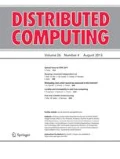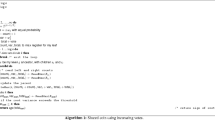Abstract
At the heart of distributed computing lies the fundamental result that the level of agreement that can be obtained in an asynchronous shared memory model where t processes can crash is exactly t + 1. In other words, an adversary that can crash any subset of size at most t can prevent the processes from agreeing on t values. But what about all the other \({2^{2^n - 1} - (n+1)}\) adversaries that are not uniform in this sense and might crash certain combination of processes and not others? This paper presents a precise way to classify all adversaries. We introduce the notion of disagreement power: the biggest integer k for which the adversary can prevent processes from agreeing on k values. We show how to compute the disagreement power of an adversary and derive n equivalence classes of adversaries.
Similar content being viewed by others
References
Afek Y., Attiya H., Dolev D., Gafni E., Merritt M., Shavit N.: Atomic snapshots of shared memory. J. ACM 40(4), 873–890 (1993)
Ashwinkumar, B.V., Patra, A., Choudhary, A., Srinathan, K., Rangan, C.P.: On tradeoff between network connectivity, phase complexity and communication complexity of reliable communication tolerating mixed adversary. In: PODC, pp. 115–124 (2008)
Borowsky, E., Gafni, E.: Generalized FLP impossibility result for t-resilient asynchronous computations. In: STOC, pp. 91–100 (1993)
Borowsky E., Gafni E., Lynch N.A., Rajsbaum S.: The BG distributed simulation algorithm. Distrib. Comput. 14(3), 127–146 (2001)
Chaudhuri S.: More choices allow more faults: set consensus problems in totally asynchronous systems. Inf. Comput. 105(1), 132–158 (1993)
Chandra T.D., Hadzilacos V., Jayanti P., Toueg S.: Generalized irreducibility of consensus and the equivalence of t-resilient and wait-free implementations of consensus. SIAM J. Comput. 34(2), 333–357 (2004)
Chandra T.D., Hadzilacos V., Toueg S.: The weakest failure detector for solving consensus. J. ACM 43(4), 685–722 (1996)
Chandra T.D., Toueg S.: Unreliable failure detectors for reliable distributed systems. J. ACM 43(2), 225–267 (1996)
Fischer M.J., Lynch N.A., Paterson M.S.: Impossibility of distributed consensus with one faulty process. J. ACM 32(2), 374–382 (1985)
Fitzi, M., Maurer, U.M.: Efficient byzantine agreement secure against general adversaries. In: DISC, pp. 134–148 (1998)
Herlihy, M., Rajsbaum, S.: The decidability of distributed decision tasks (extended abstract). In: STOC, pp. 589–598 (1997)
Herlihy M., Shavit N.: The topological structure of asynchronous computability. J. ACM 46(6), 858–923 (1999)
Junqueira F., Marzullo K.: A framework for the design of dependent-failure algorithms. Concurr. Comput. Pract. Exp. 19(17), 2255–2269 (2007)
Lo, W.-K., Hadzilacos, V.: Using failure detectors to solve consensus in asynchronous shared-memory systems (extended abstract). In: WDAG, pp. 280–295 (1994)
Saks M.E., Zaharoglou F.: Wait-free k-set agreement is impossible: the topology of public knowledge. SIAM J. Comput. 29(5), 1449–1483 (2000)
Vitányi, P.M.B., Awerbuch, B.: Atomic shared register access by asynchronous hardware (detailed abstract). In: FOCS, pp. 233–243 IEEE (1986)
Zielinski P.: Anti-Omega: the weakest failure detector for set agreement. Distrib Comput 22(5–6), 335–348 (2010)
Author information
Authors and Affiliations
Corresponding author
Rights and permissions
About this article
Cite this article
Delporte-Gallet, C., Fauconnier, H., Guerraoui, R. et al. The disagreement power of an adversary. Distrib. Comput. 24, 137–147 (2011). https://doi.org/10.1007/s00446-010-0122-4
Received:
Accepted:
Published:
Issue Date:
DOI: https://doi.org/10.1007/s00446-010-0122-4




